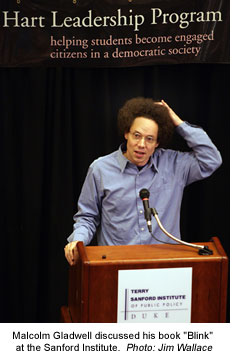Blink Author Praises Snap Judgments
Gladwell uses psychology, neuroscience to explain why initial impressions are often the best

Best-selling author and New Yorker columnist Malcolm Gladwell surveyed the standing-room-only crowd at the Terry Sanford Institute of Public Policy last week and observed that it was a far cry from a reading he did when his first book, The Tipping Point, was first published.
"There were three people there," he said. "My friend, his girlfriend who barely spoke English and the mother of another friend."
Gladwell has come a long way since then. The Tipping Point: How Little Things Can Make a Big Difference spent 28 weeks on the New York Times bestseller list and earned him a wide and diverse following of fans. Last week he was at Duke to promote his new book, BLINK: The Power of Thinking Without Thinking.
In BLINK, Gladwell examines "rapid cognition," split-second impressions and decisions that "are more complicated than has been assumed," he said at the Sanford Institute. Using the disciplinary lenses of neuroscience and psychology, Gladwell urges people to become more aware that "snap judgments and first impressions offer a much better means of making sense of the world," particularly in high-stress situations, than previously thought.
Gladwell started his presentation with the story of Abbie Conant, a trombonist who auditioned for the (then) all-male Munich Philharmonic in 1980. A member of the selection committee was tangentially related to one of the applicants, so to ensure the appearance of impartiality, a screen was erected to conceal the musicians. The philharmonic's musical director was floored by one performance -- but beside himself to then discover that "Herr Conant was actually Frau Conant." Without the visual cues usually provided by live auditions, the musical director judged only with his ears and selected a woman for the first time in the orchestra's history.
"Auditions are about snap judgments," he said. "I'm arguing that this kind of thinking is not marginal. This kind of thinking is fundamental to the way we live our lives."
Gladwell also discussed the Amadou Diallo case, where four New York police officers shot 41 bullets into an unarmed young black man. In that situation, the officers' snap judgments -- a black man standing alone late at night acting suspiciously must be a criminal -- added up to bad decision-making that resulted in death. "For the most part we are bad at recognizing biases that creep into our thinking, and we're bad about taking steps to remedy those biases."
Gladwell's talk was sponsored by the Sanford Institute's Hart Leadership Program and Durham's Regulator Bookshop.